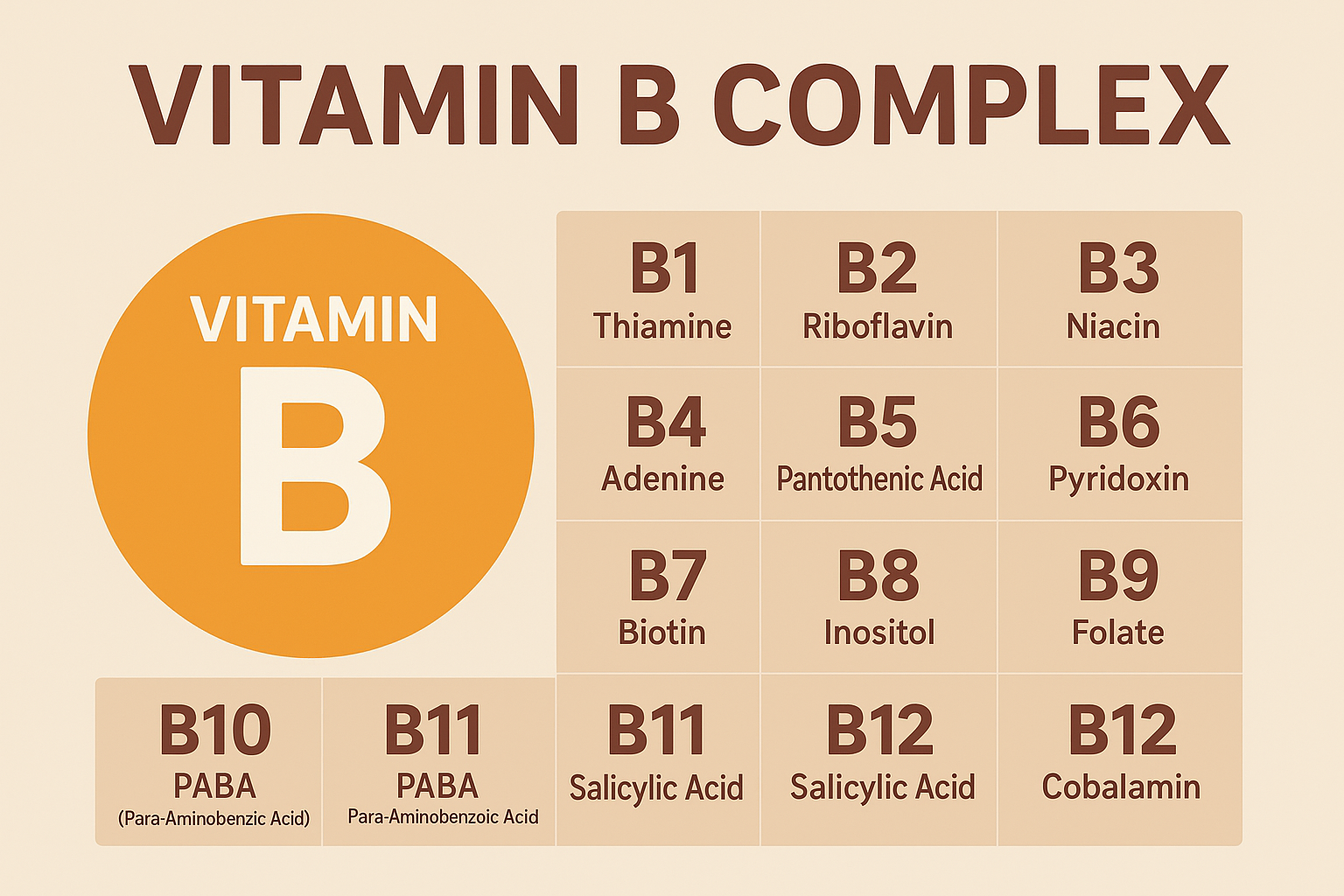Vitamin B Complex – Parts, Names, and Health Benefits
What is Vitamin B Complex?
Vitamin B Complex is a group of water-soluble vitamins that play a crucial role in maintaining energy, nerve health, and overall body function. These vitamins help convert food into energy, support brain activity, and promote healthy skin and digestion.
Since Vitamin B is water-soluble, it doesn’t get stored in the body for long and needs to be consumed regularly through diet or supplements.
Deficiency of any part of the Vitamin B Complex can lead to fatigue, poor appetite, nerve problems, and various diseases.
Key Characteristics of Vitamin B Complex
- It provides vitality and strength to the body.
- Essential for nerve health and proper digestion.
- Increases appetite and improves absorption of nutrients.
- Water-soluble in nature and easily destroyed by alkaline substances.
- Can withstand temperatures up to 120°C, but higher heat destroys it.
- Remains stable when boiled with acids but not with alkalis.
Parts of Vitamin B Complex and Their Names
Scientists have identified 12 main vitamins under the Vitamin B Complex group. Each has its own specific function and benefits for the body:
| Vitamin Number | Name | Function |
|---|---|---|
| B1 | Thiamine | Helps in energy production and nerve function. |
| B2 | Riboflavin | Supports skin health and converts food into energy. |
| B3 | Niacin | Aids in digestion, skin health, and lowers cholesterol. |
| B4 | Adenine | Plays a role in cell growth and tissue repair. |
| B5 | Pantothenic Acid | Essential for hormone production and metabolism. |
| B6 | Pyridoxin | Helps in red blood cell formation and brain function. |
| B7 | Biotin | Important for hair, skin, and nail health. |
| B8 | Inositol | Supports mental health and fat metabolism. |
| B9 | Folate (Folic Acid) | Crucial for cell growth and fetal development during pregnancy. |
| B10 | PABA (Para-Aminobenzoic Acid) | Supports skin and intestinal health. |
| B11 | Salicylic Acid | Believed to play a role in metabolism and detoxification. |
| B12 | Cobalamin | Vital for nerve tissue health, brain function, and red blood cell production. |
Functions and Importance of Vitamin B Complex
Each vitamin in the B-complex performs unique functions, but together they:
- Maintain healthy metabolism.
- Boost energy levels.
- Improve brain and nerve function.
- Promote healthy skin, hair, and nails.
- Strengthen the immune system.
- Support red blood cell formation.
Sources of Vitamin B Complex
You can get Vitamin B Complex naturally from a balanced diet. Some rich sources include:
- Whole grains (brown rice, oats)
- Eggs and dairy products
- Leafy green vegetables (spinach, broccoli)
- Fish and meat (salmon, chicken, liver)
- Nuts and seeds
- Legumes (beans, lentils, peas)
Deficiency Symptoms of Vitamin B Complex
Deficiency of Vitamin B Complex may cause:
- Weakness and fatigue
- Loss of appetite
- Nerve pain or numbness
- Anemia
- Skin rashes or cracks on lips
- Hair loss and brittle nails
- Depression or irritability
How to Maintain Healthy Levels of Vitamin B Complex
- Eat a balanced diet including whole foods.
- Avoid overcooking, as heat can destroy B vitamins.
- Limit alcohol consumption, which reduces absorption.
- Consider Vitamin B Complex supplements after consulting a doctor.
Conclusion
Vitamin B Complex is not a single vitamin but a family of essential nutrients that work together to keep the body active, strong, and healthy. Each part of the complex has its own function, and a deficiency in any one can disturb the overall balance. Including B-rich foods in your daily diet is the best way to ensure vitality and wellness.
Frequently Asked Questions (FAQs)
Q1. What is Vitamin B Complex used for?
Vitamin B Complex helps in converting food into energy, maintaining nerve health, and promoting healthy skin and hair.
Q2. Is Vitamin B Complex good for daily use?
Yes, as it is water-soluble and not stored in the body, it should be consumed daily through food or supplements.
Q3. Can Vitamin B Complex increase energy?
Yes, it helps convert carbohydrates into glucose, which boosts your energy levels.
Q4. What happens if there is a deficiency of Vitamin B Complex?
Deficiency can cause fatigue, poor digestion, nerve pain, and skin problems.
Q5. Which foods are high in Vitamin B Complex?
Eggs, fish, dairy, green vegetables, whole grains, and nuts are rich in B vitamins.

